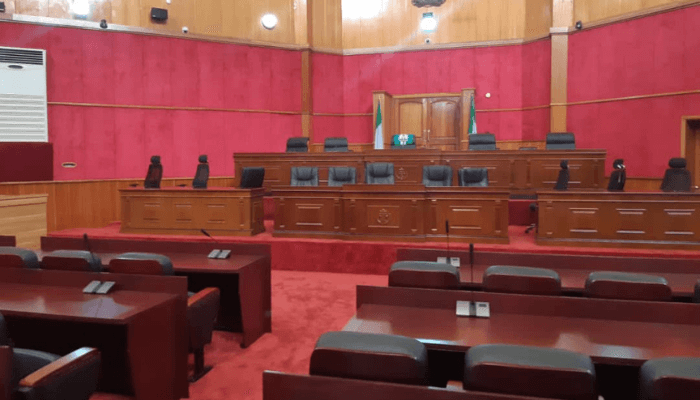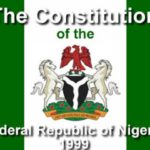As the election season rounds up across the country with the presidential, National Assembly, governorship and Houses of Assembly elections concluded, the judiciary is positioning to begin hearing on election petitions.
The 21-day window for the filing of petitions at the Presidential Election Petition Tribunal ends today following the announcement of the results on March 1, which saw Bola Tinubu of the All Progressives Congress (APC) declared the winner.
To comply with the 21-day timeframe provided in Section 132(7) of the Electoral Act, 2022, the APC and Tinubu; the Peoples Democratic Party (PDP) and its candidate, Atiku Abubakar; and the Labour Party (LP) and its candidate, Peter Obi; have since filed and obtained permission from the Court of Appeal to inspect materials used in the conduct of the elections.
Section 132(8) of the Electoral Act provides that the hearing and determination would be decided within 180 days. Thereafter, another 60 days for the appeal.
‘How some INEC staff attempted to compromise election results’
Group calls for cancellation of FCT senatorial election
The Presidential Election Petition Tribunal, which will sit at the Court of Appeal complex in Abuja, is the court of original jurisdiction on matters involving presidential, vice presidential, and National Assembly election disputes under the Nigerian Constitution.
Section 239 (1) of the Constitution provides that: “Subject to the provisions of this Constitution, the Court of Appeal shall, to the exclusion of any other court of law in Nigeria, have original jurisdiction to hear and determine any question as to whether – (a) any person has been validity elected to the office of president or vice-president under this constitution; or (b) the term of office of the president or vice-president has ceased; or (c) the office of president or vice-president has become vacant.”
The constitution also provides that the Court of Appeal will be seen to be duly constituted in the hearing and determine an election petition under Paragraph (a) of Subsection (1) of the section.
Further, Section 285(1) provides that: “There shall be established for the federation one or more election tribunals to be known as the National Assembly Election Tribunals which shall, to the exclusion of any or tribunal, have original jurisdiction to hear and determine petitions as to whether – (a) any person has been validly elected as a member of the National Assembly.”
Section 285(2) of the constitution also provides that: “There shall be established in each state of the federation one or more election tribunals to be known as the Governorship and Legislative Houses Election Tribunals which shall, to the exclusion of any court or tribunal, have original jurisdiction to hear and determine petitions as to whether any person has been validly elected to the office of governor or deputy governor or as a member of any legislative house.”
Section 285 of the constitution and Section 130 of the Electoral Act states that the Election Petition Tribunal shall be constituted not later than thirty (30) days before the election and open its registry for business seven (7) days before the election.
After the lead counsel to LP, Levy Uzoukwu (SAN), accused the Independent National Electoral Commission (INEC) of failure to provide materials in all the 36 states, including the FCT, as ordered by the court, there are concerns about how the parties would timeously conduct a complete inspection and filing of their cases either to sustain the election results as declared by or to upturn them.
But for the 2015 presidential election when former President Goodluck Jonathan did not challenge his loss to Muhammadu Buhari at the Presidential Election Petition Tribunal, every other election since 2003 had been challenged at the tribunal.
Buhari had in 2003 as the then candidate of the All Nigeria Peoples Party (ANPP) challenged the outcome of the election that saw the re-election of Olusegun Obasanjo, which was dismissed on December 20, 2004.
Unhappy with the judgment, Buhari approached the Supreme Court, which on July 1, 2005, affirmed the judgement of the tribunal and maintained that Obasanjo won the election.
On November 1, 2009, the Supreme Court affirmed the validity of the 2007 presidential election that brought President Umaru Yar’Adua to power despite the challenge by Buhari of the ANPP and former Vice President Atiku Abubakar of the Action Congress seeking to nullify the votes.
The 2007 presidential election was generally described by local and international observers as deeply flawed because of widespread intimidation, disorganisation and fraud.
As candidate of the Congress for Progressive Change (CPC), Buhari again in 2011 challenged the election of Jonathan. But the Supreme Court on December 28, 2011, affirmed the decision of the Court of Appeal and upheld the victory of President Goodluck Ebele Jonathan in the election which held on April 16, 2011.
The court threw out the appeal and affirmed the decision of the Court of Appeal which upheld the victory of President Goodluck Jonathan and Vice President Namadi Sambo as winners.
Arbitration specialist, John Elechi Agada, President Institute of Chartered Mediators and Conciliators (ICMC), believes that mediation can be used to resolve the issues, but to a limited amount, because the dispute has gone beyond the individuals to the party level.
According to him, there are already constitutional provisions for resolving the issues.
The ICMC president added that mediation could still be used to resolve intra-party and pre-election disputes.
Professor Paul Idornigie (SAN) submitted that the use of Alternative Dispute Resolution (ADR) in election dispute might be difficult to employ in post-election disputes.
According to him, post-election issues are controlled and regulated by the Nigerian Constitution and the Electoral Act.
Idornigie said, “How does ADR work, especially for arbitration? The parties must agree to arbitrate, unlike litigation where I don’t need your consent to sue you. For ADR, we must agree to mediate and arbitrate.
“Ideally, pre-election disputes can be handled by ADR, but from the players I’m seeing on our political field, I do not see them agreeing to arbitration.”
Speaking on his expectations for the tribunal hearing, Hameed Ajibola Jimoh Esq said he believesd the judiciary was ready for the adjudication of election disputes.
he said, “The ground for my thought is because the courts have made Practice Directions on Election Petitions as required by law which is a sine qu anon to the commencement of election petitions for the purpose of the general elections.”
For his part, Jude Daniels said the judiciary as the bastion of hope and the last line of defence or final weapon of attack for the common man must always be ready for petitions and other complaints.
He said, “The charge to the judiciary is to be above board, as Nigerians this time around will put the court itself on trial,” he said.
“They must be courageous and emboldened to do justice even if the heaven falls.
“This may be the last golden opportunity for the judiciary to redeem its reputation that have been dastardly battered by the political and influential class in the society.”
Also reacting, Malachy Nwaekpe Esq said he believed the judiciary had prepared itself “to deliver justice in one way or the other.”
By John C. Azu & Adelanwa Bamgboye, Lagos

 Join Daily Trust WhatsApp Community For Quick Access To News and Happenings Around You.
Join Daily Trust WhatsApp Community For Quick Access To News and Happenings Around You.

